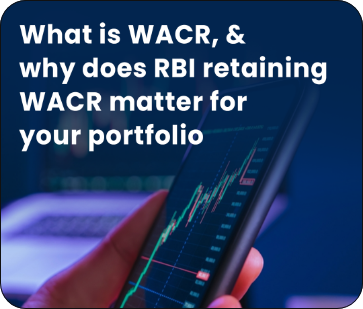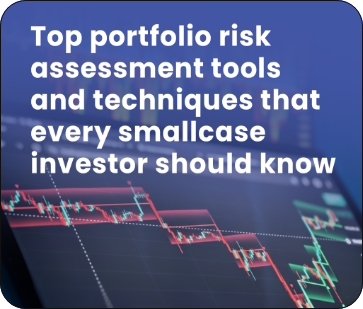
Is Smallcase safe? An insightful guide for first-time investors
Smallcase is the perfect "gateway drug" to investing!
Well, every generation has its own signature entry point to investing. It was mutual funds in the early 2000s, and direct equity trading after 2015.
But today, the best option for beginners who are digitally native, curious and averse to all that investment jargon, the best pick is smallcase.
And understandably so! After all, it simplifies investing as curating a basket of stocks built around a clear theme or strategy.
But the very first question any first-time investor gets hit with, right after they consider smallcase, is - is it safe?
Let's end this debate once and for all! In this article, we examine how small cases work and whether and how much they are safe compared to other investment options.
Table Of Contents:
What is smallcase, and how does it work?
Just imagine this! You want to invest in the stock market. Still, you don't want to spend your Sundays researching individual stocks, listening to quarterly earnings calls, or second-guessing whether HDFC or ICICI will outperform next quarter.
You just want something smarter, curated, and ideally, built around themes you believe in. Here comes the smallcase!
Smallcase investment is a fintech innovation that simplifies investing by offering baskets of stocks or ETFs curated around a strategy, sector, or theme. These are not mutual funds. You own the stocks directly.
The smallcase platform acts more like a marketplace, where SEBI-registered professionals create ready-to-invest portfolios, called smallcases, and you can buy into them via your existing brokerage account.
This model allows first-time investors to skip the mental fatigue of DIY stock-picking while retaining full transparency and control over what they own. Whether you're bullish on EV adoption or looking for long-term fundamentals, you can find a smallcase for that.
Advantages of choosing Smallcase
Smallcases offer something rare: a fusion of professional insight and investor autonomy. That alone is a strong pitch. But let's get into specifics:
Transparency at every level
You see each stock in the basket, track its performance in real-time, and get rationale updates from the manager.
Thematic exposure
Want to invest in India's consumption story or green energy? Smallcases let you tap into those narratives with ease.
Low barrier to entry
Start with a few thousand rupees. No lock-ins. You can rebalance or exit at your convenience.
Direct ownership
Unlike mutual funds, here you actually hold the shares. This gives you dividend benefits, tax efficiency, and voting rights.
Curation by experts
SEBI-registered research analysts and advisors build these portfolios. The good ones blend quantitative screening with narrative insight.
It's this thoughtful intersection of ease and expertise that makes Smallcases a popular gateway into equity markets.
Potential risks of smallcase investment
Now, let's look at the potential risks of smallcase investment!
Smallcases are not immune to market volatility. In fact, many are more concentrated than diversified mutual funds. A theme-specific smallcase may underperform if its core idea hits a macroeconomic wall.
Then there's the matter of over-customization. The platform makes it easy to add or remove stocks, but doing so can defeat the purpose of a curated strategy.
Also, the quality of smallcases varies. Some are backed by rigorous research. Others? Not so much.
Just because a smallcase exists doesn't mean it's well-constructed. And even though fees are transparent, they can add up, especially for premium smallcases that charge subscription or advisory fees.
So, which smallcase portfolio and services you choose becomes imperative for your success or failure.
That's why it becomes so important to choose the best smallcase company that prioritizes fundamental research, structured portfolios, and a disciplined systematic approach. It simply reduces your chance of potential risk whatsoever to quite a low level.
How does smallcase compare to other investment options on risk factor?
When stacked against mutual funds or ETFs, smallcases occupy an in-between space.
Smallcase vs Mutual Funds
Mutual funds are actively managed, SEBI-regulated pooled investments. They're broadly diversified and designed for long-term growth. But you don't see what happens inside the fund on a day-to-day basis. Smallcases offer visibility, but often come with a narrower focus.
Smallcase vs ETFs
ETFs provide passive exposure to indices or sectors. They're cheap and low-maintenance. But they lack personalization. Smallcases give you strategy-level curation with direct equity exposure. The catch? Higher concentration = potentially higher risk.
Smallcase vs Direct Investing
Going solo on stock-picking demands time, discipline, and conviction. Most beginners lack at least two of these. Smallcases act as a training wheel. Risk is present, but you're not flying blind.
So, are smallcases safe? No investment is. But they do offer a thoughtful way to balance risk and accessibility, especially when chosen with care.
| Feature | Smallcases | Mutual Funds | ETFs | Direct Investing |
|---|---|---|---|---|
| Ownership | Direct (you own stocks) | Indirect (units of pooled fund) | Indirect (units of index/sector fund) | Direct (individual stocks) |
| Transparency | High | Medium | High | High |
| Active/Passive | Both (depends on strategy) | Mostly active | Mostly passive | Active |
| Customization | Moderate (within limits) | None | None | High |
| Risk Level | Medium to High (depends on theme) | Low to Medium | Low to Medium | Varies (based on investor skill) |
| Fees | Low to Moderate | Moderate | Low | Varies |
| Management | Curated by SEBI-registered experts | Managed by AMCs | Follow the market index | Self-manage |
How to make your smallcase portfolio safer?
Security in smallcase investing comes down to strategy, not luck. Here are practical steps you can take:
Choose quality-first themes
Momentum and macro themes can be flashy, but fundamentals tend to hold up better in downturns.
Rebalance regularly, not impulsively
Most smallcase portfolios come with a rebalance schedule. Stick to it. Over-trading ruins returns.
Don't customize too much
If you trust the thesis, stick with the framework. Excessive tinkering breaks the model.
Diversify across smallcases
Don't bet your entire portfolio on one idea. Pair a growth-oriented strategy with something defensive.
Check track records and creators
Look into who built the smallcase, their methodology, and how it has performed across market cycles.
For example, one of the best smallcase portfolios, i.e PINC Momentum Fundamental, offers a blend of quantitative momentum and fundamental soundness, focusing on high-performing companies backed by real earnings strength. It's designed for investors seeking upside with managed volatility.
In short, safety comes from discipline, not a guarantee. And that applies to smallcases as much as anything else in the markets.
Conclusion
Smallcase investing is not a silver bullet. But it is one of the more elegant innovations in the modern investing playbook. It bridges the gap between retail enthusiasm and institutional strategy.
If you approach it with intention, which is choosing the right themes, sticking to the process, and resisting the urge to over-manage, it can be a powerful way to grow wealth in the markets.
So yes, smallcases come with risks. But in the hands of a thoughtful investor, guided by a trusted partner, they might just be your smartest move yet.
And if you're wondering where to start, we at PINC Wealth offer expert-curated, research-backed, and diversified smallcase portfolios tailored to your risk profile and financial goals. Start your investment journey today!
Related Articles

How will the US Fed rate cut impact inflation, Indian markets and your investment portfolio?
US Fed rate cuts influence Indian markets, currency trends, and smallcase stocks. Explore sectors that benefit, risks, and smart investment strategies for 2025.
Know more
What is WACR, and why does RBI retaining WACR matter for your portfolio?
Understand WACR and RBI's revised liquidity framework. Learn how these monetary policy changes impact your smallcase investment and portfolio returns.
Know more
‘Bite-sized’ smallcase investments: Low entry-cost portfolios for new and young investors
Making investment even easier and simpler with ‘bite-sized’ smallcase portfolios. Here’s a guide for beginners on how to start and build long-term wealth.
Know more
Top portfolio risk assessment tools and techniques that every smallcase investor should know
Learn about the top portfolio risk assessment tools and techniques that every smallcase investor should know to analyse and manage the potential risk, and how financial advisors help in this effectively.
Know moreMeet the people
we served!
PINC Compounder Smallcase has simplified my investment journey. Seriously, investing has never been easy for me! Here in a single click, I could access a balanced portfolio. Thanks PINC.
Mr. Akhilesh
I was hesitant about investing, but PINC Smallcase changed that. Talking to their team and looking at their growth gave me confidence. I've seen my investments grow steadily since then. I'm impressed!
Devendra Palan
As someone with limited knowledge about the stock market, I found Pinc smallcase to be a reliable and accessible platform. Their detailed reports and analysis have given me a deeper understanding of the stocks in my portfolio. I feel confident in managing my investments.
Pratik Gandhi

Subscribe to our email list
Sign up for Expert Insights
Your Gateway to Smarter Wealth
Management!
Looking to grow your wealth with
PINC Smallcase?